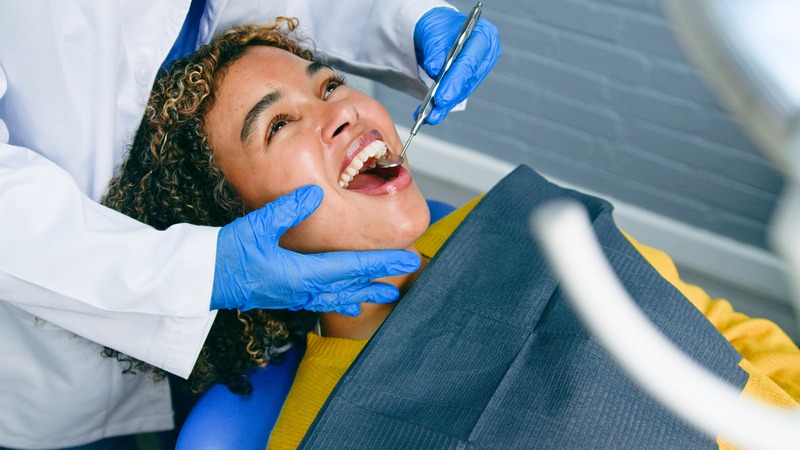Maintaining your oral health involves more than brushing your teeth occasionally. Establishing a proper routine comes with long-term health benefits, protecting your gums, teeth, and overall mouth. Oral health contributes significantly to your general well-being, making daily habits essential.
What Daily Practices Enhance Oral Health?
For better oral health, essential daily habits include brushing teeth twice daily, flossing at least once, using mouthwash, drinking sufficient water, limiting sugary intake, and staying consistent with dental check-ups. Practicing these consistently will lead to healthier teeth, gums, and breath.
Brushing Your Teeth Properly Each Day
Brushing your teeth correctly lays the groundwork for good oral hygiene. Dentists recommend brushing twice a day for at least two minutes. Using a soft-bristled toothbrush with fluoride toothpaste assists in removing debris and plaque to help sustain oral cleanliness.
Also, be gentle during brushing, taking care not to harm your gums. Using circular motions along all tooth surfaces ensures thorough cleaning. Remember to replace your toothbrush every three months or sooner as the bristles wear out.
Floss Regularly to Maintain Clean Teeth
Many skip flossing, thinking brushing alone keeps their teeth adequately clean. However, floss helps remove food particles and plaque between teeth and under gums. Daily flossing complements brushing to maintain a healthier mouth and avoid dental issues like cavities and gum disease. If you wear orthodontic retainers, it’s essential to clean them carefully to prevent plaque buildup.
To floss effectively, use a gentle sawing motion between the teeth to avoid harming delicate gum tissue. Also, floss after your evening meal to ensure food particles don’t linger overnight. Proper flossing strengthens gums and preserves tooth health over time.
Use Mouthwash to Enhance Oral Health
Adding mouthwash to your daily oral hygiene routine provides additional protection against bacteria that brushing and flossing miss. Antiseptic mouthwash targets bacteria, preventing bad breath, early gum infections, and tooth decay. Daily mouthwash also freshens breath by eliminating odor-causing bacteria from your mouth.
Choose an alcohol-free mouthwash if your mouth is sensitive or tends to dry out easily. Incorporating mouthwash into your routine after brushing and flossing maximizes its effectiveness. Integrating mouthwash regularly supports better dental hygiene and more vibrant oral health.
Stay Hydrated for Healthier Teeth
Drinking water throughout the day aids in maintaining better mouth hygiene. Water flushes out food remnants and neutralizes acid produced by mouth bacteria. Increasing daily water intake promotes healthy saliva production, which protects teeth enamel and fights off decay-causing bacteria.
Also, replace sugary drinks or sodas with water, preventing sugar residue on tooth surfaces that might lead to cavities. Drinking water frequently keeps your mouth fresh, hydrated, and less prone to dental problems. Develop a habit of carrying water bottles around for regular drinking throughout your daily activities.
Eat a Tooth-Friendly Diet
Foods you consume greatly affect your oral health. Consuming calcium-rich dairy goods, crunchy fruits, raw vegetables, nuts, and lean meats aids in maintaining stronger teeth and healthier gums. Additionally, foods high in fiber stimulate saliva production, helping cleanse your teeth naturally throughout the day.
Limit intake of sugary or sticky foods which tend to adhere to teeth, causing plaque buildup and tooth decay. Also, avoid acidic drinks lowering the risk of enamel erosion. Eating nutritional balanced meals ensures strong teeth and gums over a lifetime.
Regularly Schedule Dental Check-ups
Consistent visits to your dentist offer preventive care crucial for sustained oral hygiene. Dentists professionally clean your teeth, identify problems in their early stages, and provide valuable guidance tailored specifically to your oral care routine. Aim to schedule appointments every six months for consistent dental care and monitoring oral health progression.
In addition to regular dental check-ups, incorporating orthodontic exams Mississauga into your routine can further enhance oral health, especially if there are concerns about teeth alignment or bite issues. These exams assess and address alignment problems early, potentially simplifying future treatments.
Professional assessments involve checking mouth tissues and offering timely recommendations, minimizing any potential concerns. Early detection of dental and orthodontic issues reduces treatment complexity and helps maintain healthy teeth throughout life. Consistency in both dental and orthodontic visits enhances overall oral hygiene.
Choose Braces Options to Support Healthy Teeth
For teenagers requiring improved teeth alignment and bite correction, several braces choices exist, including metal or ceramic options. Selecting appropriate orthodontic braces for teenager involves professional orthodontic guidance considering age, lifestyle, and dental conditions.
Orthodontists recommend appropriately suited braces optimizing comfort, aesthetics, and long-term effectiveness, significantly contributing to better dental positions. Well-chosen braces facilitate hygiene adaptability, enabling teenagers to maintain excellent oral hygiene practices throughout treatment periods.
Address Teeth Grinding Immediately
Persistent teeth grinding negatively impacts tooth surfaces, enamel, and gums, increasing dental health risks significantly. Consulting your dentist provides identification, assessment, and preventive solutions, minimizing long-term oral damage concerns.
Timely interventions involve customized mouthguards protecting tooth surfaces from harsh abrasion overnight. Proactively managing teeth grinding reduces vulnerability to tooth decay, gum recession, and extensive damage caused by uncontrolled grinding habits. Prompt professional interventions normalize conditions minimizing oral health concerns significantly.
Lifestyle Adjustments Supporting Oral Health
-
Quit smoking immediately, reducing risks contributing considerably to gum disease and mouth cancers.
-
Limit alcohol intake avoiding oral cancer and harmful oral infections possibly arising from excessive use.
-
Incorporate stress management activities like yoga, meditation, or exercise minimizing potential teeth grinding or jaw tightening habits associated with stress.
-
Replace sugary beverages and snacks with healthier alternatives such as fruits, vegetables, and nuts.
-
Use protective equipment, including mouthguards, engaging in sports or recreational activities potentially hazardous to oral health.
-
Stay aware of oral changes indicating possible conditions requiring dental assessments and care urgently.
Final Thoughts
Creating efficient routines and habits brings positive outcomes concerning oral health. Consistent implementation involving these practices prevents issues from worsening, saving potential future dental treatment costs, and ensures healthier teeth and gums. Make oral hygiene part of daily commitments supporting overall wellness and enhancing your quality of life effortlessly.

